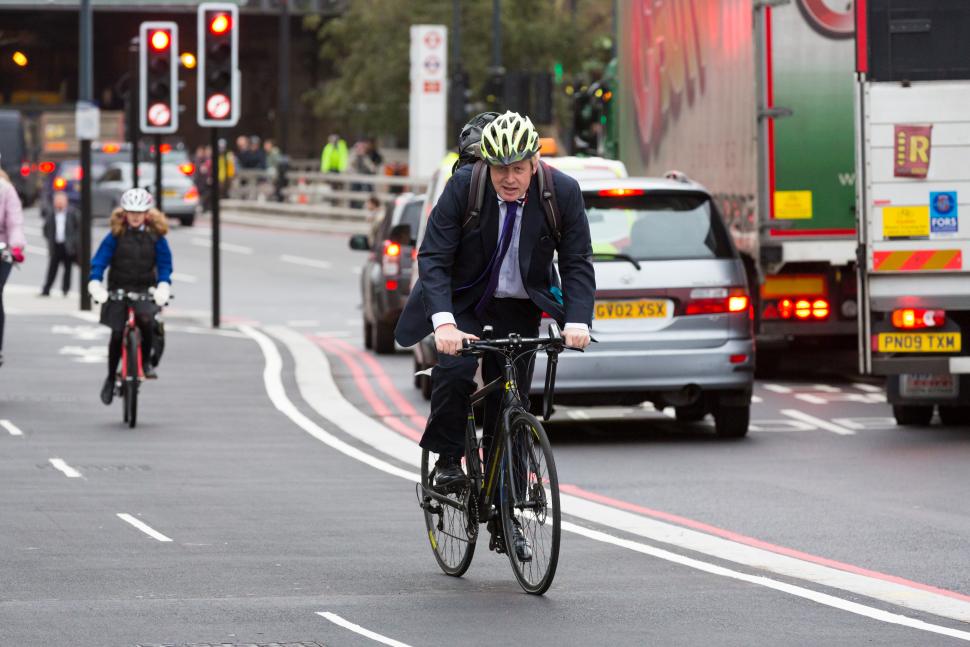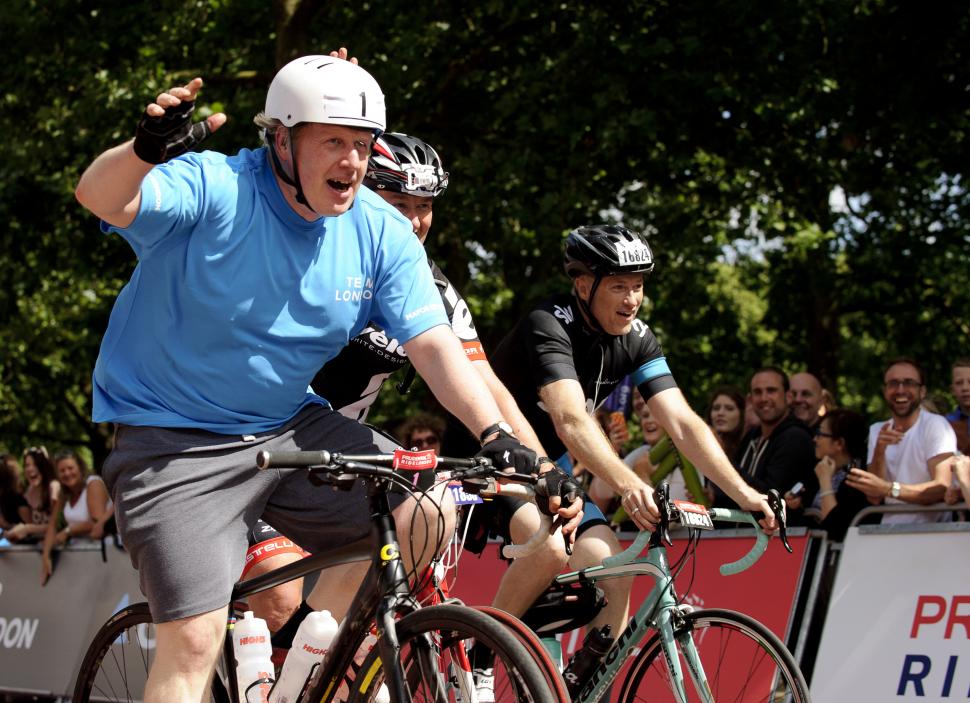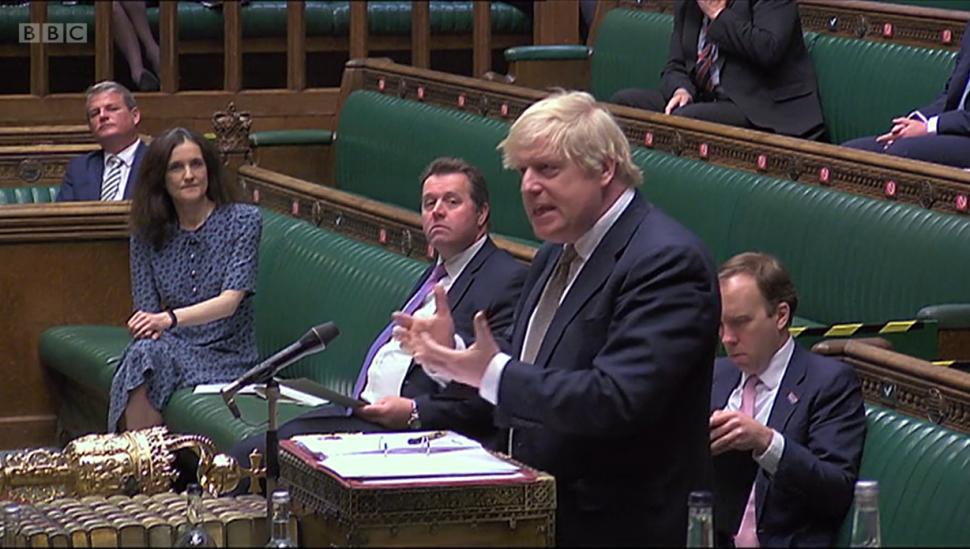- News
- Reviews
- Bikes
- Accessories
- Accessories - misc
- Computer mounts
- Bags
- Bar ends
- Bike bags & cases
- Bottle cages
- Bottles
- Cameras
- Car racks
- Child seats
- Computers
- Glasses
- GPS units
- Helmets
- Lights - front
- Lights - rear
- Lights - sets
- Locks
- Mirrors
- Mudguards
- Racks
- Pumps & CO2 inflators
- Puncture kits
- Reflectives
- Smart watches
- Stands and racks
- Trailers
- Clothing
- Components
- Bar tape & grips
- Bottom brackets
- Brake & gear cables
- Brake & STI levers
- Brake pads & spares
- Brakes
- Cassettes & freewheels
- Chains
- Chainsets & chainrings
- Derailleurs - front
- Derailleurs - rear
- Forks
- Gear levers & shifters
- Groupsets
- Handlebars & extensions
- Headsets
- Hubs
- Inner tubes
- Pedals
- Quick releases & skewers
- Saddles
- Seatposts
- Stems
- Wheels
- Tyres
- Health, fitness and nutrition
- Tools and workshop
- Miscellaneous
- Tubeless valves
- Buyers Guides
- Features
- Forum
- Recommends
- Podcast
OPINION
Boris Johnson resignation: A blow for active travel?
 Boris Johnson opens CS5
Boris Johnson opens CS5Boris Johnson’s resignation today as Conservative Party leader – he plans to stay on as Prime Minister until the autumn to allow time for his successor to be chosen, although it is widely expected a caretaker will take on the role – signals the end of what has been the most chaotic premiership of my lifetime, and that’s from someone who lived in Italy when Silvio Berlusconi was in power.
Given the u-turns and the denials swiftly followed by admissions and less-than-sincere apologies that have characterised his time in Number 10, Johnson’s departure will be widely celebrated, and not just by political opponents – but could it also stall the progress the government has been making, under his leadership, in encouraging active travel?
It’s hard to think of a single issue on which he has been more consistent – this is a man, remember, who ahead of the 2016 referendum wrote a draft newspaper column making the case for the UK remaining within the European Union alongside one arguing why it should leave it before throwing his weight behind the Leave campaign.
But back in his days as Mayor of London, he would regularly commute by bike from his Canonbury home to City Hall, and it was under his tenure there that the Cycle Superhighways programme was launched, as well as the cycle hire scheme that would give rise to the nickname ‘Boris Bikes’ (although it was his predecessor, Labour’s Ken Livingstone, who green-lit the scheme which had initially been proposed by the Liberal Democrats).
Those early cycleways, painted blue to reflect their sponsorship by Barclays, offered nothing in the way of physical segregation.
But in what turned out to be an inspired decision Johnson – who famously is not one for detail – recruited Andrew Gilligan as the city’s first cycling commissioner and one of the results was the protected cycleway running from Lancaster Gate to the Tower of London via Parliament Square and the Embankment.
Johnson and ill-thought-out infrastructure projects go hand in hand – the Garden Bridge, the airport in the Thames Estuary, the bridge linking Northern Ireland and Scotland and the Emirates Air Line cable car to name but four, with only the latter ever being built – but that cycle route, used by thousands of people each day, has proved to be transformational for getting across the heart of the capital safely and quickly.
He said at the time that bringing the project to fruition in the face of opposition including from his own party was the toughest challenge he had faced in his career to date.
“To be honest, this whole Cycle Revolution, which is really under way, is provoking the most incredible backlash, I’ve got to be honest with you,” he told the London Assembly in late 2015.
“I can’t think of anything I’ve ever done that’s provoked such direct remonstrances from everybody,” Johnson added. “Virtually every senior government minister in one way or another has ticked me off in one way or another for the Cycle Superhighways.”
When he replaced Theresa May as Prime Minister in autumn 2019, Johnson – who, as foreign minister had been banned on security grounds from riding his bike around London – swiftly appointed Gilligan as his transport advisor.
In May the following year with the country in lockdown as a result of the coronavirus pandemic heralded “a new golden age for cycling” with active travel put firmly at the heart of the country’s recovery, the government’s plans outlined in July that year in the document Gear Shift: A bold vision for cycling and walking.
> Boris Johnson reveals how he will bring in “new golden age for cycling”
Backed by a promised £2 billion budget during the life of the current Parliament, councils across England were told in no uncertain terms that projects needed to meet strict quality standards or face being denied further funding, and that schemes needed to be given time to bed in and be properly assessed, a response to a number of instances of temporary infrastructure being swiftly removed by councils due to opposition from vocal minorities.
> Department for Transport say councils must give walking and cycling schemes time
In recognition of the role they can play in tackling diverse issues including reducing congestion, promoting physical and mental health and helping fight the climate crisis, support for cycling and walking has also extended to the creation of a new body, Active Travel England, headed by Chris Boardman.
The agency is tasked among other things with improving the quality of cycling and walking infrastructure across the country outside London (where, ironically, investment in cycling has stalled due to TfL’s funding crisis brought about by the pandemic which sees it having to rely on short-term bailouts from the government, making it impossible to plan for the longer term).
The big question now from a cycling perspective is whether whoever succeeds Johnson as Prime Minister will embrace active travel with the same enthusiasm as he did?
His time in office has seen a succession of scandals that in past times would surely have long ago led to his resignation but he has clung on to his position with all the tenacity of a limpet – until now.
The collapse of support for him among his ministers and backbench Tory MPs will in large part be due to plunging support for the party in the polls and inboxes full of demands for him to go from constituents and party members, and one common theme among the dozens of letters of resignation published in recent days has been that under his leadership, the Conservative Party has lost sight of its so-called traditional values.
There’s little doubt therefore that the incoming Prime Minister will be under intense pressure to restore those to the party to bring voters back on-board – and should that person not be as engaged with and supportive of active travel as Johnson has been, there is every possibility that it is an area of policy that could become a casualty of the change in leadership.
Yes, there are some Conservative local authorities that do embrace active travel – Bournemouth, Christchurch and Poole Council, currently rolling out a network of protected cycle lanes in partnership with Dorset Council, springs to mind – but they are very much in the minority and others, such as the Royal Borough of Kensington & Chelsea, actively resist having segregated infrastructure on their key roads.
> PM Boris Johnson ‘ballistic’ over scrapping of Kensington High Street cycle lane
Here on road.cc, we’ve covered numerous examples of Conservative councillors and MPs opposing initiatives aimed at improving conditions for people on bikes, while the Daily Mail – whose editorial stance reflects its core readership, which closely aligns with much of the party’s voter base – has made no secret of its view of cycling infrastructure, and bike riders in general unless they happen to be winning Olympic gold medals.
It may well be a number of weeks until we know the identity of Johnson’s successor. But whoever it is, he or she will bring their own priorities to Number 10, including how best to spend what money is available as the country heads towards a forecast recession, and how to win back voters who have withdrawn their support in recent months. It would be a pleasant surprise if continuing to back active travel were high up the agenda – but I’m not going to hold my breath.
Simon joined road.cc as news editor in 2009 and is now the site’s community editor, acting as a link between the team producing the content and our readers. A law and languages graduate, published translator and former retail analyst, he has reported on issues as diverse as cycling-related court cases, anti-doping investigations, the latest developments in the bike industry and the sport’s biggest races. Now back in London full-time after 15 years living in Oxford and Cambridge, he loves cycling along the Thames but misses having his former riding buddy, Elodie the miniature schnauzer, in the basket in front of him.
More Opinion
Latest Comments
- Raptorman 5 hours 16 min ago
Franklin is out of touch with reality in the world of road cycling. The number of people killed or ending up in emergency rooms, the existence of...
- NickJP 5 hours 16 min ago
The review says "tapered head tube", but the photos accompanying it clearly show that the head tube is not tapered.
- mark1a 7 hours 18 min ago
Well... as it happens, I have the Bosch EasyPump. I bought it a year ago with some Christmas gift money. Its main use is on my van which doesn't...
- eburtthebike 8 hours 7 min ago
"...as mayor aims to bring “credibility” to active travel initiatives...."...
- Simon E 10 hours 19 min ago
I do too. It's a 'real world' read fill of people doing real world riding instead of a glossy lightweight brochure for spenders and dreamers....
- FionaJJ 11 hours 4 min ago
Exactly. I won't lie, I did quite enjoy pointing out that the reason olive oil had got so much more expensive was because of the droughts in the...
- chrisonabike 14 hours 31 min ago
What about all the computer misuse? Stop with the downloading already!
- brooksby 14 hours 54 min ago
"Professional Triangle tire Punctured tire Nail for Spike Anti-Theft car Safety Emergency car" Sorry, but WHAT??
- HollisJ 16 hours 48 min ago
Have you seen the size of Micras these days? Now, it it were a Micra from the 80s...



Add new comment
37 comments
As you suggest, Baker won't win the contest. But there is a real risk of the change of leadership leading to the abandoning of green policies. The government's net zero targets are not popular in much of the conservative party.
Didn't COP26 (remember that) make those targets legally binding or am I dreaming that? In any case I think nature itself will continue to press the case by throwing us an unending sequence of terrifying weather events.
Yes, but it'll be fine because they will only abandon them in very limited and specific ways...
"could it also stall the progress the government has been making"?
Probably yes. Johnson is a bad person - but bad people do sometimes do good things (even if they're still not good enough on active travel).
His successor will be a better human being and probably Prime Minister, but I suspect their commitment to active travel won't be one of the reasons why. I hope to be proved wrong...
Can you let us know which conservative MP is "a better human being" than Boris Johnson? I appreciate it's a low bar, but I still can't think of any. I think it is, unbelievably, downhill from here folks.
I don't believe an honest, trustworthy person could ever get to be Prime Minister. If one did they would have to tell all the powerful people and corporations who got them there that they would not be repaying all the owed favours but instead working for the good of the country and ordinary people. They'd be out within hours.
You mean that they're human beings? Huh - you learn something new...
Pages